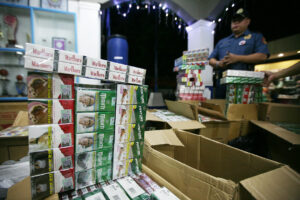THE Philippine Tobacco Institute (PTI) said on Thursday that a pause in raising excise taxes on tobacco could steer consumers away from smuggled cigarettes and stabilize prices of legitimate products.
“By pausing the annual excise tax increases, the prices of legitimate products such as cigarettes can stabilize and decrease the incentive for consumers to purchase illicit smuggled products,” PTI President Jericho B. Nograles told a Senate hearing looking into the illicit trade of tobacco products.
“The second reason is the moratorium period can also strengthen enforcement measures against illicit trade.”
The Philippines imposes an excise tax of P60 per pack of 20 cigarettes while vape products are levied a P54.60 per milliliter (mL) tax for salt nicotine and P63 per 10 mL tax for classic nicotine products, according to the excise tax rates prescribed by the Bureau of Customs for 2024.
The Bureau of Internal Revenue said on Tuesday that it collected P130.91 billion in tobacco excise taxes in the first 11 months of 2024, well behind the pace needed to hit the year’s target of P185.34 billion.
Mr. Nograles also cited Singapore’s imposition of a similar moratorium, which he said eventually boosted tax collections.
The PTI is also calling for the government to revisit the tax system and to come up with a single excise tax rate for all vapor products to simplify collection and implementation, he said.
Mr. Nograles also pushed for the Department of Justice to aggressively go after smugglers, illicit importers, and traders of tobacco products.
In September, President Ferdinand R. Marcos, Jr. signed into law a measure classifying agricultural smuggling, hoarding, profiteering, and financing of these crimes as acts of economic sabotage.
Republic Act No. 12022, or the Anti-Agricultural Economic Sabotage Act, imposed a fine equivalent to five times the value of smuggled or hoarded agricultural products, with violators also under threat of life imprisonment.
The law treats smuggling and hoarding of agricultural products as economic sabotage when the value of goods exceeds P10 million.
“Illicit tobacco trade created imbalanced and inequitable conditions against the legitimate tobacco industry,” Mr. Nograles said.
“The tobacco industry is happy to pay taxes so long as the illicit trade is kept at bay, as it undermines so many other government efforts.” — John Victor D. Ordoñez

